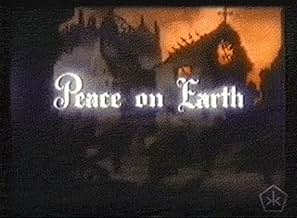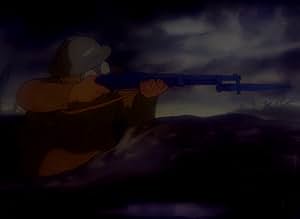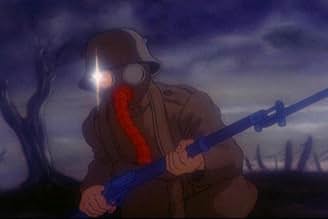Two baby squirrels ask grandpa to explain what "men" are when they hear everyone singing of "peace on earth, goodwill to men". Grandpa tells the story of man's last war.Two baby squirrels ask grandpa to explain what "men" are when they hear everyone singing of "peace on earth, goodwill to men". Grandpa tells the story of man's last war.Two baby squirrels ask grandpa to explain what "men" are when they hear everyone singing of "peace on earth, goodwill to men". Grandpa tells the story of man's last war.
- Nominated for 1 Oscar
- 1 nomination total
- Grandpa Squirrel
- (voice)
- (uncredited)
- Child Squirrels
- (uncredited)
- Vocalists
- (voice)
- (uncredited)
- Child Squirrels
- (uncredited)
- Grandma Squirrel
- (uncredited)
Featured reviews
Know Hugh Harman more for his cartoons that have a cute approach with a lot of sentiment. There have been times where this approach has been done sweetly and charmingly, there have also been other times where it can be too cutesy and cloying. My review summary is in no way a derogatory knock against Harman, far from it. It is alluding to that 'Peace on Earth' is a Harman cartoon that is darker and grimmer to usual. A more mature Harman cartoon and it's good, great even.
'Peace on Earth' is not what one would call subtle, there is a very important, admirable and powerful message that certainly makes its point and at times in too thick a way perhaps. It is though a message cartoon, meaning that there was always a trap of it being on the preachy side.
Regardless, 'Peace on Earth' makes a big emotional impact. It packs a very poignant punch and really makes one think about what it's trying to say. The beginning and end scenes are cute but not too sentimental, while the darker content in between provokes thought and moves. Story-wise, it's simple but this is a good thing, making the cartoon easier to understand and resonate with.
The characters carry the cartoon beautifully, they look adorable in appearance but show stronger personalities than one would expect. Mel Blanc voices beautifully, this is a less manic Blanc than in his Looney Tunes oeuvre, something that was a perfect fit and the right one.
Animation is rich in detail for design and backgrounds, vibrant in colour and crisp. Composer for the prime-era 'Tom and Jerry' cartoons and regular Tex Avery composer Scott Bradley provides a lush and atmospheric music score.
Overall, great cartoon, as well as being perhaps Harman's most mature cartoon it's one of his best. 9/10 Bethany Cox
It's simplicity probably makes this all the more thought-provoking.
The trade press also raved: "Definitely a 'must'...should be seen by every man, woman and child...(Showmen's Trade Review) "A cartoon off the beaten track. Timely, amusing! (Film Daily) "Timely. Excellent. Admirably suited to Christmas programs!" (Motion Picture Daily)
The M-G-M ads for "Peace On Earth" all carried an uncommon "Created by Hugh Harman" attribute.
This has probably the strongest impact of any cartoon I have ever seen -- taking the era in which it was made into account -- and must have been virtually without precedent in 1939. Powerful post-war rivals might include "Animal Farm", "Watership Down", or "When the Wind Blows". Or Art Spiegelman's Pulitzer Prize-winning "Maus" in the field of the graphic novel.
There are scenes here of animated warfare which are still a little grim by modern standards. Childlike innocence gets temporarily suspended. "All Quiet on the Western Front" is an immediate comparison.
As was normal in the '30's, the coming war in Europe was viewed as an extension of the Great War, so we see the technology familiar from 20 years previous -- trenches, gas masks, unturreted tanks. When Neville Chamberlain bought peace for all time from Hitler at Munich, the sort of war he had succeeded in averting was the one depicted in this film. The new World War II technology did not enter the general consciousness until the averted war got underway in Sept. 1939.
I first saw this film about a decade ago, and rediscovered it recently on a compilation video entitled "MGM Cartoon Christmas". The other cartoons on the tape, "Alias St. Nick" and "Pups' Christmas", show quite clearly what a break with convention "Peace on Earth" was at the time.
Despite being an anti-war film from the late 1930's, the message isn't very clear, beyond demonstrating man's inability to maintain a peaceful society with animals succeeding after man's demise. There are religious icons sprinkled throughout the film, but there aren't used to preach any messages, as one would suspect from a film of this kind. Their presence in the film also seem vague.
The elder squirrel's recollections of man's war echoes the horrors of World War I, which was still strongly in the public's recollection at the time. In fact, it almost feels like an alternative timeline of WWI.
Harman and Ising were known for trying to compete with Disney. They were really the only men that come close to replicating Disney's polished animation, but storytelling was not their strength. Nonetheless, this is one of Harman's best films. Unlike most Christmas films, this one can be unnerving to some audiences due to its grim war sequences and outcomes. A post-apocalyptic film before the genre even existed (without nuclear weapons obviously).
Remade by Hannah-Barbera in 1955 as GOOD WILL TO MEN with updated horrific war imagery reflecting the Cold War and a more clear cut religious message.
Did you know
- TriviaSeveral of the animators who worked on this anti-war cartoon were veterans of World War One and had experienced combat similar to that depicted in the film. In a darkly ironic note, they would be working on wartime propaganda cartoons two years later.
- GoofsAll entries contain spoilers
- Quotes
Grandpa Squirrel: Oh, it was awful. It was terrible! Well, they fought and they fought and they fought, until... until there was only two of them left.
[two soldiers in gas masks are seen on a battlefield amid smoke and barbed wire; each soldier shoots the other and goes down, sinking into mud]
Grandpa Squirrel: ...And that was the end of the last man on earth.
- ConnectionsEdited into Tom and Jerry Christmas Special (1987)
- SoundtracksHark! the Herald Angels Sing
(uncredited)
Hymn by Charles Wesley (1730)
Music by Felix Mendelssohn (1840)
Sung by studio chorus
Details
- Runtime9 minutes
- Aspect ratio
- 1.37 : 1
Contribute to this page











